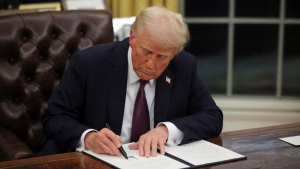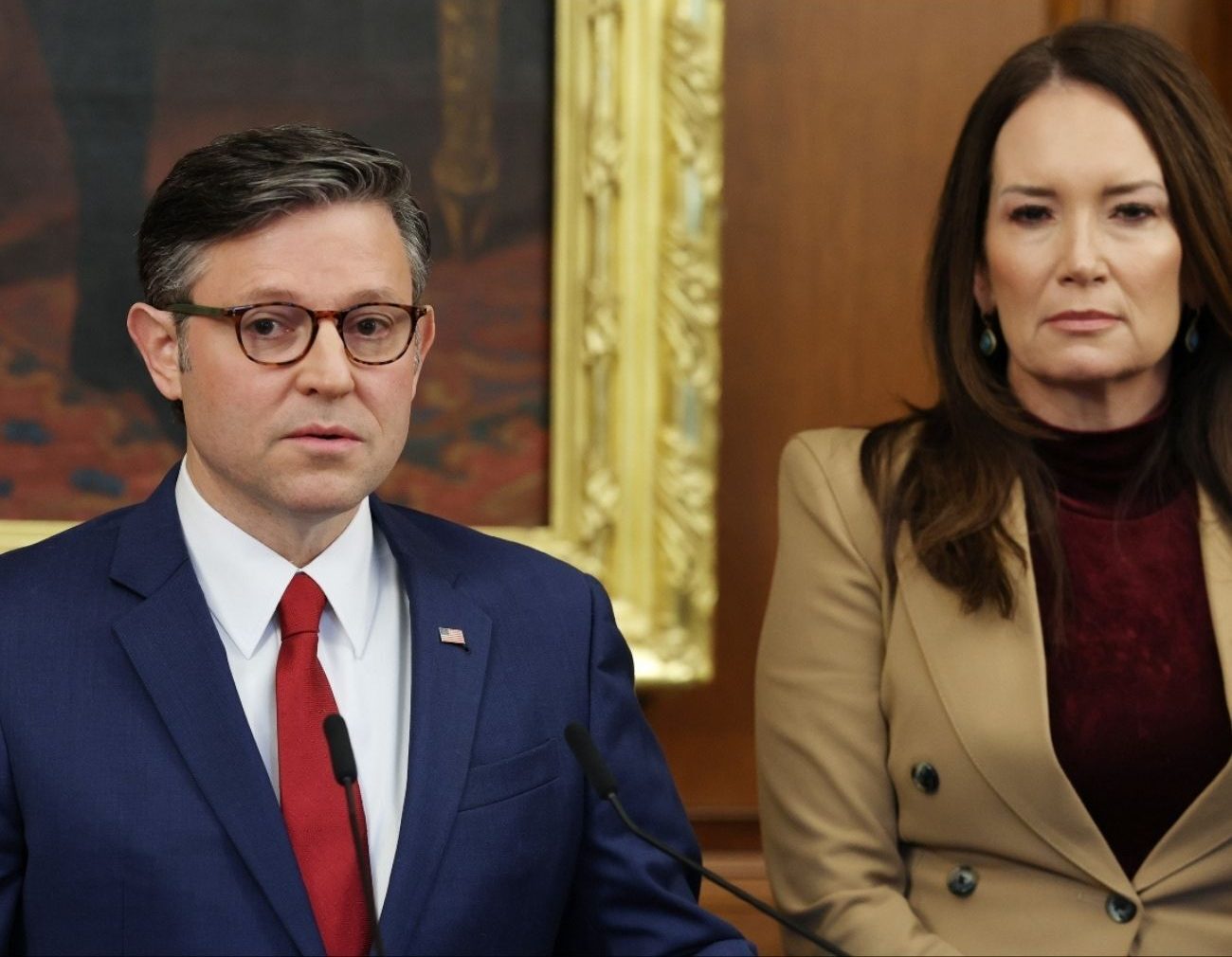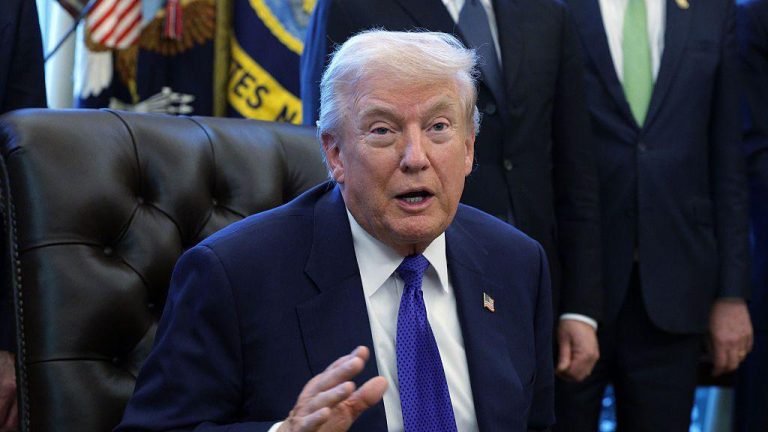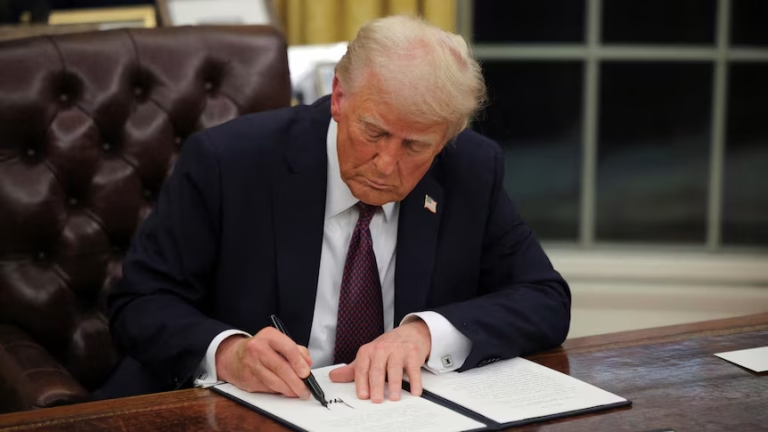WASHINGTON, D.C. — The Biden administration’s critics are pushing back hard on claims from Democrats that the U.S. Department of Agriculture (USDA) has enough contingency funds to continue food stamp benefits during the ongoing government shutdown.
In a fiery press conference Friday morning, USDA Secretary Brooke Rollins accused top Democrats of “lying” about the department’s ability to fund the Supplemental Nutrition Assistance Program (SNAP) past November 1, saying their statements were misleading millions of Americans about where the real responsibility lies.
“The fact that the Democrats are saying, ‘But wait, USDA has money in their accounts’ … is a lie,” Rollins said.
Her comments came after House Minority Leader Hakeem Jeffries (D-N.Y.) repeated the Democratic claim earlier in the week that the administration had the funds to keep SNAP payments flowing despite the government shutdown.
“They have the money,” Jeffries told reporters. “But they are choosing to withhold funding for SNAP because they want to punish hungry children, hungry veterans, hungry seniors, hungry women, and hungry families.”
Rollins, joined by House Speaker Mike Johnson (R-La.), rejected that characterization outright, calling it “a cynical attempt to shift blame for their own failures.”
https://twitter.com/OffThePress1/status/1984264768257978676
The Heart of the Dispute: What the Law Actually Allows
The USDA maintains that while a $5.3 billion contingency fund does exist, it cannot legally be accessed without an active appropriation from Congress.
Rollins confirmed that USDA officials had already twice notified state SNAP administrators in October that benefits would end November 1 if lawmakers failed to reopen the government.
“There is a contingency fund at USDA,” Rollins said. “But it is only allowed to flow if the underlying program is funded.”
According to the department, it takes roughly $9.2 billion to cover a single month of SNAP benefits — far exceeding what the reserve fund holds. The shortfall, Rollins said, made the Democrats’ argument “mathematically and legally impossible.”
Republicans at the press conference echoed that message, arguing that Democrats’ refusal to pass a clean continuing resolution (CR) — which the House approved on September 19 — is what’s truly holding up funding for federal programs like SNAP.
“Funding these programs is Congress’s job, not the USDA’s,” Johnson said. “If Democrats really cared about reopening the government and helping families, they would have voted yes instead of blocking this 14 times.”
The Shutdown’s Fallout on SNAP Families
The ongoing “Schumer Shutdown,” now entering its fifth week, has left millions of low-income households anxious about when — or if — their November SNAP payments will arrive.
The U.S. Department of Agriculture’s Food and Nutrition Service (FNS) typically distributes benefits on the first of each month, but the shutdown has frozen routine funding streams.
While the emergency contingency fund can legally be used in limited circumstances — such as natural disasters — USDA attorneys have long interpreted that provision narrowly. Rollins said the department has no authority to allocate those funds without explicit congressional approval.
“We can’t just write checks from thin air,” she said. “That’s not how constitutional budgeting works.”
Still, pressure has mounted from both sides of the aisle as public concern grows. Lawmakers in states like Ohio, Pennsylvania, and Arizona have urged the USDA to find temporary funding solutions while negotiations continue on Capitol Hill.
Courts Step In: Two Judges Rule Against the USDA
The standoff took a dramatic legal turn late Friday, when two federal judges — John McConnell in Rhode Island and Indira Talwani in Massachusetts — issued conflicting rulings ordering the Trump administration to release the USDA’s contingency reserves to cover November SNAP benefits.
Both judges, appointed by former President Barack Obama, argued that the USDA does have discretion to use its reserve funds during a shutdown, even if the underlying program is not fully funded.
“There is no doubt that the contingency funds are appropriated funds necessary to carry out the program’s operation,” Judge McConnell wrote in his decision.
Judge Talwani added that the administration “may supplement the contingency funds by authorizing a transfer of additional monies to avoid any reductions.”
The rulings effectively overrode the USDA’s interpretation of its spending authority, setting up a potential showdown between the agency and the courts over who ultimately controls SNAP funding during a budget lapse.
Rollins: “This Isn’t About Money — It’s About Power”
In her remarks, Rollins accused Democrats of using the SNAP crisis as political leverage rather than working to reopen the government.
“This isn’t about compassion; it’s about control,” she said. “Democrats claim to be the party of the people, but what they’re doing now is holding the most vulnerable hostage to score political points.”
Rollins argued that the administration has been transparent about the program’s limits, citing two internal memos to state agencies warning of the funding gap and the legal restrictions surrounding contingency fund use.
“We told them exactly what would happen if the Senate didn’t act,” she said. “Now they’re pretending we’re the ones pulling the rug out — when they’re the ones who refused to pass a bill.”
The Numbers Behind the Debate
According to USDA data, SNAP serves roughly 42 million Americans each month. The average recipient receives about $180 per month, meaning the program disburses roughly $9 billion in benefits monthly.
The $5.3 billion contingency fund covers just over half of that requirement — and only if the USDA is legally authorized to deploy it.
Republican lawmakers say that the shortfall demonstrates why Congress, not executive agencies, must handle appropriations.
Democrats counter that the administration has broader flexibility to tap other USDA accounts — including a nearly $17 billion “Section 32” fund generated from customs receipts — to temporarily sustain benefits.
However, USDA officials insist that using those funds could divert money from other vital nutrition programs, including child school meal initiatives and food safety inspections.
Political Fallout and Public Reaction
The SNAP funding controversy has quickly become a lightning rod in the broader budget impasse. Democrats have portrayed the administration’s stance as punitive toward low-income Americans, while Republicans accuse Senate Democrats of manufacturing a crisis to avoid passing a clean budget resolution.
“All the Democrats have to do is say, let’s go,” President Trump said Friday afternoon. “They don’t have to do anything — just say the government is open.”
Political analysts note that the issue cuts across partisan lines, as many of the 42 million SNAP recipients live in red and purple states. Governors in states like Georgia, Texas, and Michigan have already begun contingency planning in case SNAP benefits are delayed beyond November 10.
What Happens Next
Following the court rulings, the USDA has been ordered to submit a compliance plan outlining how and when it will disburse emergency funds. Rollins warned that technical limitations in state benefit systems could cause delays even if funding is approved immediately.
“The systems are not built to restart overnight,” she explained. “We’re talking about recalibrating the benefit flow for tens of millions of households.”
As of Friday evening, it remained unclear whether the department would appeal the federal rulings or comply under protest. The White House has not yet issued a formal statement.
Meanwhile, hunger advocacy groups have urged both parties to de-escalate the political fight and prioritize reopening the government.
“This isn’t a red issue or a blue issue — it’s a human issue,” said Lisa Hamlin of the Food Justice Network. “Families can’t wait for Washington’s gridlock to end.”
The Bottom Line
The fight over SNAP funding has become a high-stakes flashpoint in the broader budget standoff, exposing deep divisions over both fiscal authority and political responsibility.
While the courts may provide a temporary reprieve for food stamp recipients, long-term stability will depend on whether Congress — not the USDA — can finally agree on a spending bill.
As Rollins put it:
“We don’t print money. Congress does. And until they do their job, programs like SNAP will continue to hang in the balance.”

Emily Johnson is a critically acclaimed essayist and novelist known for her thought-provoking works centered on feminism, women’s rights, and modern relationships. Born and raised in Portland, Oregon, Emily grew up with a deep love of books, often spending her afternoons at her local library. She went on to study literature and gender studies at UCLA, where she became deeply involved in activism and began publishing essays in campus journals. Her debut essay collection, Voices Unbound, struck a chord with readers nationwide for its fearless exploration of gender dynamics, identity, and the challenges faced by women in contemporary society. Emily later transitioned into fiction, writing novels that balance compelling storytelling with social commentary. Her protagonists are often strong, multidimensional women navigating love, ambition, and the struggles of everyday life, making her a favorite among readers who crave authentic, relatable narratives. Critics praise her ability to merge personal intimacy with universal themes. Off the page, Emily is an advocate for women in publishing, leading workshops that encourage young female writers to embrace their voices. She lives in Seattle with her partner and two rescue cats, where she continues to write, teach, and inspire a new generation of storytellers.








